How Big Brother Mzansi’s season five racked up more than 200 million votes in its final week
Every year, hundreds of thousands of visitors flock to the hamlet in central Henan province which has become an attraction with its idealised vision of village life right out of the Communist past.
While the Communist Party prepares to give a second term to its current supremo, Xi Jinping, at a major congress next week, Nanjie still clings firmly to Mao, while glossing over the turbulence and violence of his rule.
The village’s 3,700 residents wake up every morning to broadcasts praising Mao and start their work days with a hearty group rendition of “red” songs about the virtues of Communism.
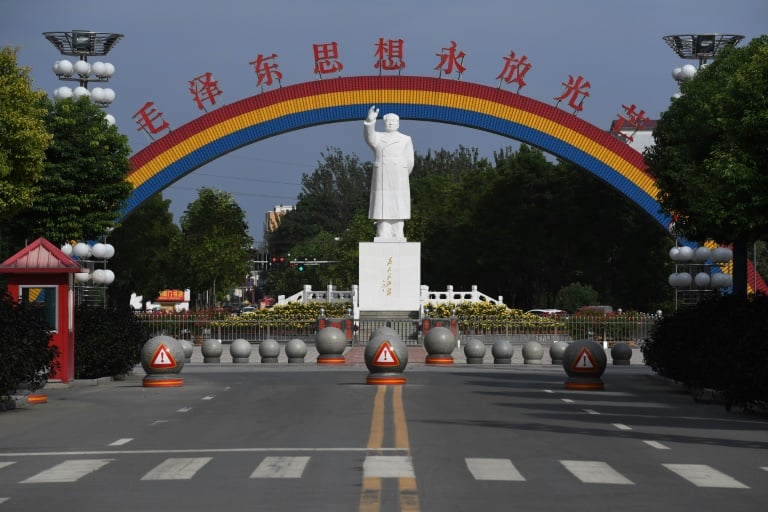
Nanjie follows a retro model of collectively-owned enterprises and chirpy ideological indoctrination, appearing frozen in an era before market reforms transformed China into the world’s second largest economy
Nanjie follows a retro model of collectively-owned enterprises and chirpy ideological indoctrination, appearing frozen in an era before market reforms transformed China into the world’s second largest economy.
Tourists take small red trams with names like “Moderate Prosperity” and “Chinese Dream” from the giant Mao statue in the town’s iconic “East is Red Square” to parks, factories and public housing blocks where residents share stories about the joys of collectivism.
But its brand of Communism looks set to make a comeback, attracting more than just tourists these days, with Xi recently telling top officials that the party “would lose its soul and direction” if it deviated from Marxism.
Even “Xi is asking everyone to study Chairman Mao,” said Wang Hongbin, who has been Nanjie’s party secretary since 1976 and will attend next week’s congress in Beijing.
Since taking power in 2012, Xi has pushed for more state control over the economy while Communist Party branches are being set up inside private enterprises for employees to study party ideology.
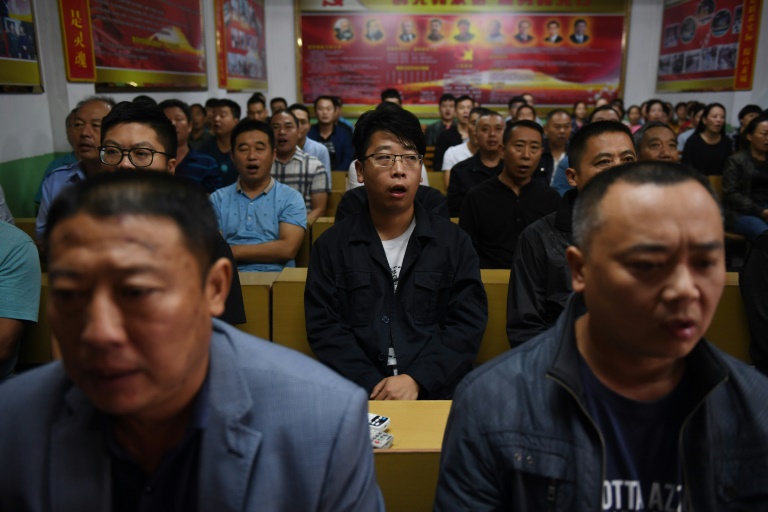
Factory managers sing communist “red” songs at the start of their work day in Nanjie village
He has also dramatically increased ideological indoctrination in schools and the workplace and tightened media controls.
Recently, nostalgia seekers have been replaced by local officials and party members “coming to study the Nanjie spirit,” local journalist Lie Xiujuan said as she led visitors on a tour of the village’s botanical gardens, which feature a life-size replica of Mao’s childhood home.
– ‘Closer and closer’ –
In the 1980s, when most of China was sprinting away from Mao-era collectivism, Nanjie’s party secretary Wang doubled down.
He turned up the ideological volume and offered free housing, health care and food to residents working for a pittance at village-owned enterprises.
The moves found favour with the country’s leftists, but many people “didn’t understand Nanjie, didn’t support it or even criticised it,” Wang recently told state media.
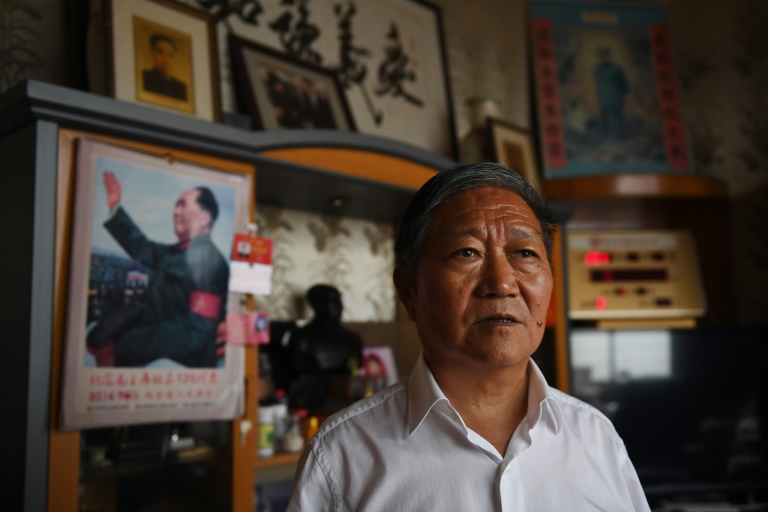
In the 1980s, when most of China was sprinting away from Mao-era collectivism, Nanjie’s party secretary Wang turned up the ideological volume
Since the last party congress in 2012, however, “the central government’s voice has grown closer and closer to Nanjie’s way of doing things.”
Today, residents live in modest public apartments, identical right down to the furniture and flatscreen TVs.
“Everything is managed very well,” government employee Wang Chunju said as she sat in her community-provided flat, fidgeting with her iPhone.
– ‘Real communists’ –
But it is hard to tell how much is real and how much is a show for Nanjie’s more than 500,000 visitors a year.
A weekly newspaper publishes “positive” news alongside Mao quotes and stories.
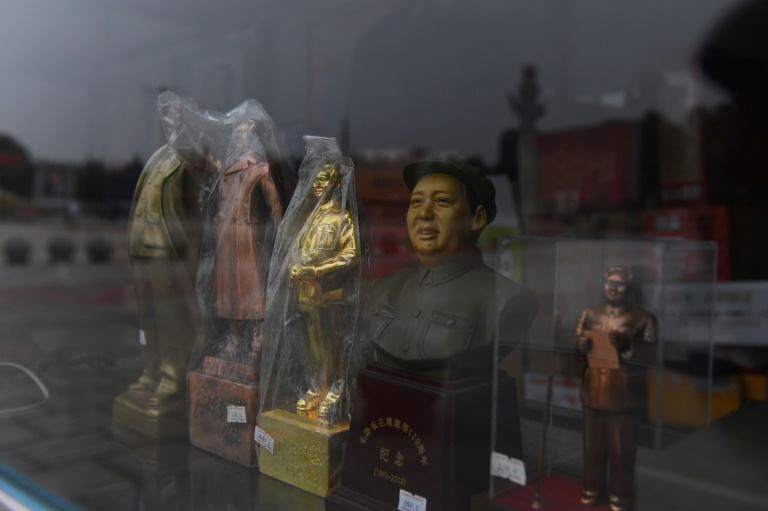
Shoppers at Nanjie’s largest store can use a government-issued card to buy cabbage and onions, but they can also purchase gold jewelry or a carved wooden Mao
At Nanjie’s instant noodle factory, local officials freely admitted to staging “every day” performances of Communist “red” songs for the benefit of visiting reporters.
Nanjie’s economics are also more complicated than advertised.
The village may be a Communist collective, but much like China’s overall economy, its development is unequal and massively leveraged.
Shoppers at the village’s largest store can use a government-issued card to buy cabbage and onions, but they can also purchase gold jewelry or a carved wooden Mao, retailing for 16,900 yuan ($2,570).
Over 90 percent of the workers at Nanjie’s 26 cooperatives are recruited from outside the village and do not enjoy its benefits.
In 2008, an investigation by Southern Metropolis Daily revealed the village had taken out more than 1.6 billion yuan of bank loans due to what Wang described as “economic problems”.
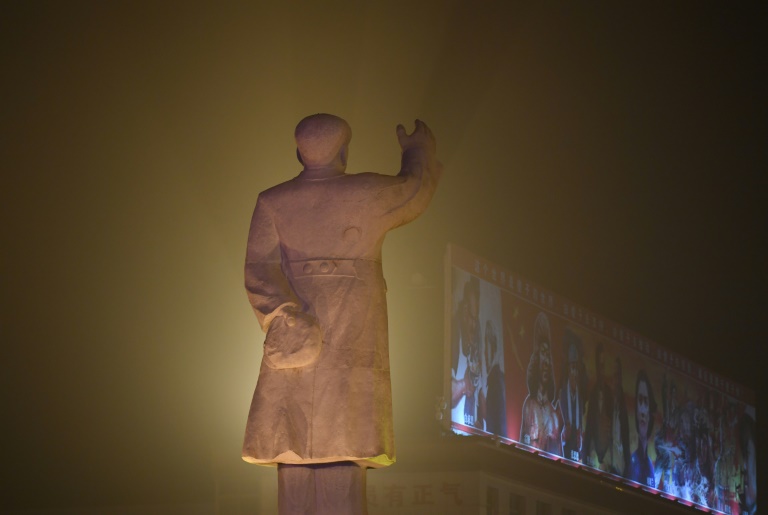
While officials say tourism makes only a small contribution to Nanjie’s economy, its image is an asset that earns it the support of top politicians, as well as the general public
China’s “leaders” ordered Henan to solve the issue, he told AFP, and the debts were effectively forgiven.
Now the village “relies on the strength of its own enterprises to develop”, he said, adding that profits have grown by 24 percent year-on-year.
Although Wang and other government officials receive a monthly salary of only 250 yuan ($38), he previously owned almost 10 percent of the collectives’ holding company, according to the Southern Metropolis Daily report.
In 2014, the corporation underwent a change in shareholders, but the records have been sealed.
While officials said tourism makes only a small contribution to Nanjie’s economy, its image is an asset that earns it the support of top politicians, as well as the general public.
Outside Nanjie’s gates, a woman working at a liquor store admiringly explained the village’s fascination.
“They’re real Communists over there,” she said with a laugh. “I guess you could say the rest of us are capitalists.”
Download our app